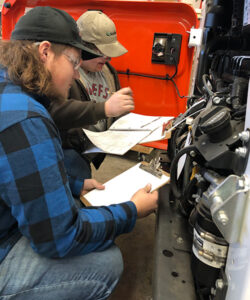Settling in with CDEs
Preparing for spring career development events begins in the classroom.

Commonly known as contests in the FFA community, Career Development Events (CDEs) require more than luck or good timing. From skill to dedication and much preparation, oftentimes, the road to success in CDEs starts with a foundation of knowledge built in classroom education.
“At the Cass Career Center, we prepare students for Career Development Events by teaching all students a foundational level of knowledge and skills of the CDE in the course where the curriculum is aligned,” says Jason Dieckhoff, one of the agricultural education teachers and FFA advisors at Cass Career Center. “For example, we teach the content knowledge and performance skills of the Forestry CDE in our Conservation course, starting six weeks prior to the start of CDE events. In our Veterinary & Equine Science course, we train students for the Equine CDE. We feel all students benefit from the training, not just students who will be on the team.”
CDEs aim to give students an outlet to apply knowledge from the classroom to the field. Amanda Haeberlin, agricultural education teacher and FFA advisor at Palmyra High School, says agricultural curriculum’s focus on career exploration pairs well with preparation for CDEs. Students’ interest in what they’re learning lends well to them joining a team in the spring.
“I often mention why it’s part of the contest and how it applies to industry,” Haeberlin explains. “Plus, if you are teaching the curriculum, for a lot of them, it happens naturally.”
These teams are an essential addition to agricultural education, allowing students to apply content directly related to industry careers.
“They help students gain a number of skills,” Haeberlin says. “Job skills, speaking, work ethic. They give students a chance to excel outside of athletics. And they help them learn to deal with success and failure.”
Dieckhoff adds, “CDEs are also important because they are designed by a collaboration of industry representation and post-secondary colleges, so we keep training our students to the current industry demands and can adapt to new trends in the agriculture industry.”
Once they understand the significance of CDEs, it’s important to motivate students and sort out their intentions for the season ahead.
“Ag teachers have to rely on the personal relationships they have built with each student to see what will motivate them to do their best,” Dieckhoff explains. “Maybe that can be done through making practices fun or exciting, maybe it’s offering the only positive comments the student will hear in a day, and maybe it is convincing the student that they need this experience later on in their life.”
Haeberlin adds that it is important to find out the student’s end goal. “Do they want to learn something new and have fun or do they want that and to be competitive and win,” she says. “If we all are not on the same page, we won’t enjoy contest season.”
Dieckhoff believes measuring the success of a CDE team looks different than one might expect.
“After 18 years of teaching, I have found students have success on a CDE when it significantly impacts their future,” he notes. “Having former students who took a job as a meat cutter after competing in the Meats CDE or get a job in a florist shop after doing the Floriculture CDE means more than any plaque on the wall. Those former students are making a real difference in their communities, and it was inspired by their involvement in CDEs.”
by Brandelyn Twellman




